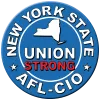Legislative Alert: January 27, 2023
President's Message
Improve Workforce Recruitment and Retention
Going into the 2023-24 state budget cycle, the New York State AFL-CIO and our affiliates have prioritized several initiatives that will help with the lingering problems with recruitment and retention in the workforce. The staffing shortages have plagued many sectors but remain an acute problem in the public sector, health care industry, and lower-wage jobs. This endangers vital services and in turn deteriorates other sectors like public safety and tourism.
Child Care is an important measure to help address this. Last year the Governor and Legislature prioritized childcare funding, raised the eligibility threshold for subsidies to make more working families eligible, and made other programmatic changes to the system. This is critical both for working families that need child care and the child care providers themselves and we must continue that progress this year if we expect to increase the rate at which individuals are taking jobs. With the ability to work remotely being much more common than it was several years ago, increased costs for transportation and inflation factored in. If workers do not have affordable and easily accessible child care it’s a barrier for people to work. We must remove this problem from that equation.
The New York State AFL-CIO has long supported the Child Care Facilitated Enrollment (CFE) program which assists workers in applying for subsidies, streamlines the eligibility process, helps locate providers and otherwise helps workers obtain the child care they need. This is essential for individuals with affordability issues but also language barriers, those who work non-traditional hours, or many others who are unable to navigate the systematic barriers to getting child care. The CFE program should serve as a model for the Governor’s proposal to streamline and create navigational aid for employers and we will continue to strongly support funding an expansion of this valuable program.
Increasing and indexing the minimum wage is also crucial to motivating and incentivizing people to accept jobs. Inflation and other increased costs of living should be enough to justify annual and predictable increases in the minimum wage but clearly, these regular increases will also help incentivize people to take positions they may not have otherwise considered. A methodical and annual increase will also incentivize employers to raise the wages of longer-tenured employees, easing the pressure of wage compression and helping employers retain those more experienced workers. This will help unionized workers as well because the current system causes stagnation of the minimum wage and creates downward pressure on wages, making it harder to negotiate increases. Indexation will create upward pressure on wages across the board and this will help unions negotiate better contracts.
Finally, fixing Tier 6 must be a priority in the public sector. The contribution rates for Tier 6 employees are higher than all other previous Tiers and, in some cases, significantly higher. At the same time, the increased employee costs yield lesser benefits than their co-workers in other tiers. This makes it extremely difficult to attract workers and even more difficult to keep them for the long term. The contributions should be lowered for all employees and the salary bands that kick in progressively higher employee rates should be made fairer, or eliminated, both to recruit new workers and retain longer-tenured workers. Adjusting the final average salary calculations, the inclusion of overtime in pensionable salary, and increasing the calculations for longer-tenured employees will also give them a reason to stay longer. We must build on the reforms that were started in 2022.
We look forward to working with our affiliates and all of our elected officials on these and other solutions to the staffing problems.
Mario Cilento, President
2023 Legislative Agenda
Click here to see the 2023 Legislative Agenda
Upcoming Meeting
LABOR LOBBYISTS MEETING
Monday, February 6, 2023, 1:00 p.m.
